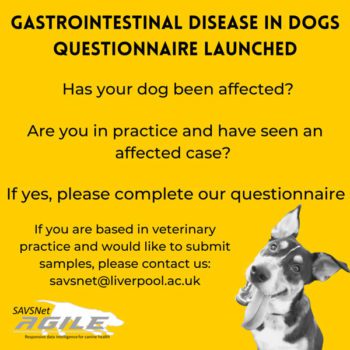4 Feb 2022
SAVSNET has asked vets across the country with patients suffering vomiting or has diarrhoea to complete a questionnaire and supply a faecal sample.

 Vets have been urged to provide information after one of the UK’s leading surveillance networks declared an outbreak of gastrointestinal disease earlier this week (3 February).
Vets have been urged to provide information after one of the UK’s leading surveillance networks declared an outbreak of gastrointestinal disease earlier this week (3 February).
SAVSNET has now a classified a high number of incidents of the disease across Yorkshire as an outbreak, and experts are calling on vets across the UK who think they may have come across a case to share their findings through a questionnaire on the University of Liverpool’s website.
The group, based at the University of Liverpool, used anonymised data provided by vets to determine that a disease initially thought to have originated on the beaches of Yorkshire is in fact an outbreak in seasonal gastrointestinal disease.
In a statement, the group said that, based on data it has received, it can confirm there is an above normal increase of gastrointestinal disease affecting dogs in certain parts of the country.
In most areas, these increases seem to be in line with normal seasonal variation. However, in Yorkshire, analysis suggests these increases are more sustained over several weeks and it can be described as an outbreak.
Now, researchers at the disease tracking group are seeking more information to allow them to better understand where the disease came from and how best to tackle it.
Detailing data taken from questionnaires already submitted to the group, researchers found that the most common clinical signs reported were inappetence, and vomiting and diarrhoea, both without blood.
The majority (79%) of dogs had not visited the beach prior to becoming ill and many cases were reported away from the coast.
The vast majority of cases (94%) had been vaccinated in the last three years. The majority (56) of the 88 owners who had more than one dog reported that other dogs in the household had also shown similar signs, possibly suggesting an infectious cause.
Researchers also found that most dogs seem to recover within 7 to 14 days, although more than 60% required treatment of some form. No underlying cause was reported and so the aetiology of the outbreak is still unknown.
SAVSNET has also asked for vets with a patient that is vomiting or has diarrhoea to submit a faecal sample to the group.
Alan Radford, professor of veterinary health informatics at the University of Liverpool and a member of the SAVSNET team, said: “As we work hard to understand this potential outbreak, it is important to remember that none of our research would be possible without veterinary practitioners, as well as diagnostic laboratories, contributing data to SAVSNET.”